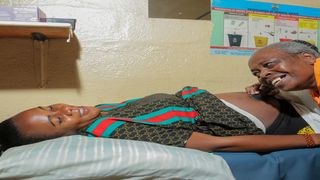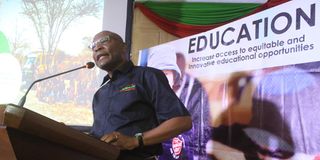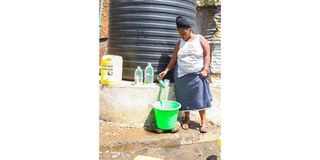
Jackline Vihenda at a prenatal check-up done by Constance Okoth, a nurse at St. Marys Medical clinic in Kibra, Nairobi. The Safaricom Foundation donated medical equipment to the facility.
|Laying the foundation for transforming lives
What you need to know:
- The foundation has remained true to this mission.
- It is transforming the lives of more than five million Kenyans across the 47 counties.
When Safaricom Foundation was registered as a charitable trust in 2003, the mission was one — to transform lives. At the time, Safaricom had one million subscribers.
Close to 20 years later, the foundation has remained true to this mission, transforming the lives of more than five million Kenyans across the 47 counties.
“I remember before we registered Safaricom Foundation, every so often you would find the then-CEO Michael Joseph handing over a cow to a community, books to a school or such projects. But it was not structured,” recalls Joseph Ogutu, the chairman of the Safaricom Foundation.
Later on, in 2010, the M-Pesa Foundation came to be, implementing large-scale and long-term highly impactful social projects to complement the work of the Safaricom Foundation.
This, he says, was an indication that the company had a purpose from the onset.

Joseph Ogutu at a forum on sustainable development goals in 2017.
The Safaricom Foundation has now grown to be one of the largest corporate foundations in Kenya with an investment of more than Sh3 billion.
With a strong history of partnerships dating back to inception, the foundation has implemented more than 1,400 community projects investing heavily in education, health, economic empowerment, environmental conservation, water and disaster response interventions.
“We have developed a partnership model with more than a thousand partners who serve as implementers to help us reach places we cannot,” explains Mr Ogutu.
Over the years, corporate responsibility has evolved from implementing pet projects, which offered minimal benefits to either business or society to shared value where companies are engaging in projects that address major strategic issues and challenges.
This new responsibility means that the token school desks and water tanks donated every year and conspicuously marked with the logo of the corporate sponsor no longer suffice.

Lucy Wairimu, a resident of Korogocho in Nairobi, fetches water from a tank donated by Safaricom Foundation.
Businesses are now expected to be part of the solution to the world’s greatest challenges as captured in the Sustainable Development Goals (SDGs).
It is no wonder that goal 17 of the SDGs is partnerships. For companies ready to take on the agenda, the goals provide a platform to show responsibility, pursue opportunity and innovation and inspire other businesses to get on board. And one way to do this is through corporate responsibility initiatives.
Three areas
Safaricom Foundation has not been left behind in this shift. From focusing on eight thematic areas in 2003, the foundation has narrowed down to three strategic areas of education, health and economic empowerment, crucial pillars for addressing the challenges currently undermining social development for all.
At inception, the foundation would solely rely on projects conceptualised by the community members, reviewing hundreds of applications each month for funding.
But under the current strategy 2018-2021, the foundation has identified long-term highly impactful projects where it has invested Sh132 million in each of the projects for three years.
“We identified these focus areas as those that require great intervention to ensure improved quality of life for communities across the country,” said Mr Ogutu.
“Our interventions in these areas will also contribute immensely towards the achievement of the Sustainable Development Goals, which we have incorporated into our day-to-day operations at Safaricom.”
We constantly challenge the boundaries and take communities beyond.
This is in addition to the philanthropy projects that the foundation undertakes through initiatives such as Ndoto Zetu (Swahili for ‘our dreams’).
To enable employees to give back to the community, Safaricom Foundation allows them to engage in community projects of their choice where the foundation funds 90 per cent of the total cost of the project while the employee raises the 10 per cent. This has allowed employees to engage with their local communities.
Moving forward, the Safaricom Foundation seeks to engage on more integrated projects.
“We are coming from a position where we are doing single projects here and there to an integrated approach. If you are doing a water project, for example, you want to see this in the context of hygiene, food security and health,” said Mr Ogutu.
This will largely be reliant on data from social, health and economic experts.
Reflecting on the past 20 years of Safaricom and the impact the two foundations have had over the years Mr Ogutu says finding a balance between the needs of the company and those of the community and developing solutions for both is immensely rewarding.
“Innovation remains key to the growth of any company more so Safaricom, and as we continue, we constantly challenge the boundaries and take communities beyond.”


